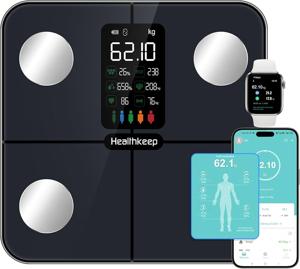Smart scales have revolutionized how we track our health and fitness. These devices go beyond just measuring weight, offering insights into body composition.
Smart scales can measure body fat percentage, muscle mass, and other important health metrics, giving users a more complete picture of their overall fitness.
Many smart scales connect to smartphone apps, making it easy to track progress over time. This feature allows people to set goals and monitor changes in their body composition.
Some scales even sync with popular fitness apps, creating a seamless health tracking experience.
When shopping for a smart scale, it’s important to consider accuracy, features, and ease of use. The best smart scales offer a balance of these factors, providing reliable data and user-friendly interfaces.
With the right smart scale, tracking body fat and other health metrics becomes a simple part of any wellness routine.
Key Takeaways
- Smart scales measure body fat, muscle mass, and other health metrics beyond just weight
- Many smart scales sync with smartphone apps for easy progress tracking
- Choosing the right smart scale involves considering accuracy, features, and user-friendliness
Understanding Smart Scales
Smart scales offer more than just weight measurements. They provide detailed body composition data to help track health and fitness progress.
What Are Smart Scales?
Smart scales are advanced weighing devices that measure more than just body weight. They track body composition metrics like body fat percentage, muscle mass, and bone density.
These scales connect to smartphones via Bluetooth or Wi-Fi.
Most smart scales come with a user-friendly app. The app stores and displays data over time, making it easy to track progress. Some scales can recognize multiple users, allowing families to share one device.
Smart scales are useful for people trying to lose weight, gain muscle, or improve overall health. They provide a more complete picture of body changes than traditional scales.
How Do Smart Scales Work?
Smart scales use bioelectrical impedance analysis (BIA) to measure body composition. This method sends a weak electrical current through the body. The current flows differently through various tissues, allowing the scale to estimate body fat, muscle mass, and water content.
When a person steps on the scale, sensors in the metal pads make contact with their feet. The scale then sends the electrical signal and measures the resistance it encounters.
The scale’s built-in software uses this data, along with the user’s height, age, and gender, to calculate body composition percentages. These results are then sent to the connected smartphone app for easy viewing and tracking.
It’s important to note that while smart scales provide useful estimates, they may not be as accurate as professional medical equipment.
Key Health Metrics and Measurements
Smart scales measure several important health metrics beyond just weight. These measurements give a more complete picture of body composition and overall health status.
Body Mass Index (BMI)
BMI is a simple ratio of weight to height. It’s calculated by dividing weight in kilograms by height in meters squared. A normal BMI range is 18.5 to 24.9.
BMI can indicate if someone is underweight, normal weight, overweight, or obese. But it has limits. It doesn’t account for muscle mass or fat distribution.
Some smart scales calculate BMI automatically after inputting height. This saves time compared to manual calculations.
Body Fat Percentage
Body fat percentage measures the amount of fat relative to total body weight. Normal ranges vary by age and gender. For men, 10-20% is often considered healthy. For women, 18-28% is typical.
Smart scales use bioelectrical impedance to estimate body fat. A small electrical current passes through the body. Fat resists the current more than other tissues.
This method isn’t perfect but can track changes over time. It’s less accurate for very muscular people or those with certain medical conditions.
Muscle Mass and Fat Mass
Muscle mass refers to the weight of muscle in the body. Fat mass is the total weight of body fat. These measurements give more detail than just weight or BMI alone.
Smart scales can measure muscle and fat mass separately. This helps track fitness progress. Gaining muscle while losing fat is a common goal.
Seeing these numbers change can be motivating. It shows progress even when overall weight stays the same.
Bone Mass and Body Water Percentage
Bone mass is the weight of bones in the body. It’s important for assessing bone health and density. Higher bone mass can mean stronger bones.
Body water percentage is the amount of water in the body. It affects hydration levels and overall health. Normal ranges are 50-65% for men and 45-60% for women.
Smart scales estimate these metrics using bioelectrical impedance. The results aren’t as accurate as medical tests but can show trends over time.
Heart Rate and Basal Metabolic Rate (BMR)
Some advanced smart scales measure heart rate through the feet. This gives a resting heart rate reading. A normal resting heart rate is 60-100 beats per minute.
BMR is the number of calories burned at rest. It’s based on factors like age, gender, height, and weight. Knowing BMR helps with setting calorie goals for weight loss or gain.
Smart scales estimate BMR using personal data and body composition measurements. This can be useful for planning diets and exercise routines.
Using Your Smart Scale Effectively
Smart scales offer more than just weight measurement. They can track various health metrics and support multiple users. Here’s how to get the most out of your smart scale.
Optimizing Accuracy of Readings
For accurate readings, place the scale on a hard, flat surface. Avoid carpets or uneven floors.
Users should step on the scale with bare feet to allow for body fat measurements.
Consistency is key. Weigh at the same time each day, preferably in the morning after using the bathroom. Wear similar clothing or none at all for each weigh-in.
Stay still while on the scale. Movement can affect readings. Some scales require users to stand in a specific position for optimal accuracy.
Keep the scale clean and dry. Moisture or dirt can interfere with measurements. Regular calibration may be necessary for some models to maintain accuracy.
Tracking Health Metrics Over Time
Smart scales can measure weight, BMI, body fat percentage, muscle mass, and more. Use the connected app to view trends over time.
Set realistic goals for weight management or muscle gain. The app may offer features to input lifestyle changes or exercise routines.
Don’t focus solely on weight. Body composition changes can occur without significant weight loss. Track multiple metrics for a complete picture of health progress.
Use the data to adjust diet and exercise plans. Celebrate small victories in health metrics improvements. Remember that progress takes time and can fluctuate day-to-day.
Multi-User Functionality and Profile Management
Many smart scales support multiple users. Each person should create their own profile in the app. This ensures accurate tracking and personalized insights.
Some scales can automatically recognize users based on weight or body composition. Others may require selecting a profile before stepping on.
Keep profiles updated with current height, age, and activity level. This improves the accuracy of calculated metrics like BMR and body fat percentage.
Set privacy settings for each user. Some may prefer to keep their data private from other household members. Regularly sync the scale to ensure all users’ data is up-to-date in the app.
Choosing the Right Smart Scale for You
Smart scales offer more than just weight measurement. They track body fat, muscle mass, and other health metrics. Picking the right one depends on your needs and budget.
Factors to Consider When Buying a Smart Scale
Price is a key factor when choosing a smart scale. Some budget-friendly options offer good features without breaking the bank. Look for Black Friday deals to save money.
Accuracy is vital. Pick scales that give consistent readings. Some scales use bioelectrical impedance to measure body fat. This method is generally reliable for home use.
App compatibility is important. Make sure the scale works with your smartphone. Good apps make data easy to read and track over time.
Battery life varies between models. Some scales use replaceable batteries. Others have rechargeable ones. Think about which type suits you best.
Recommendations and Smart Scale Features
User-friendly interfaces make scales easier to use. Look for clear displays and simple setup processes. Some scales recognize multiple users automatically.
Wi-Fi connectivity allows scales to sync data without your phone nearby. This feature is handy but may cost more.
Extra health metrics can be useful. Some scales measure heart rate, bone density, and water percentage. Think about which metrics matter most to you.
Some scales integrate with fitness apps like Apple Health or Google Fit. This integration helps you see all your health data in one place.
Smart scales with pregnancy modes can be helpful for expectant mothers. These modes adjust measurements to account for pregnancy-related changes.
Frequently Asked Questions
Smart scales use various technologies to measure body composition metrics beyond just weight. These devices provide insights into body fat, muscle mass, and other health indicators. Let’s explore some common questions about smart scales and body fat measurement.
How do smart scales measure body composition?
Smart scales use bioelectrical impedance to measure body composition. They send a weak electrical current through the body. Fat, muscle, and other tissues have different resistance levels, allowing the scale to estimate body composition percentages.
What are the most accurate smart scales for body fat measurement?
Some of the most accurate smart scales for body fat measurement include models from Withings, Garmin, and Renpho. These scales often use advanced sensors and algorithms to improve precision.
Can smart scales also measure muscle and water percentages?
Yes, many smart scales can measure muscle and water percentages. Advanced models track multiple body composition metrics, including muscle mass, bone density, and body water percentage.
What features should I look for when choosing the best smart scale?
When choosing a smart scale, look for Wi-Fi connectivity for easy data syncing. Multi-user support, app integration, and a wide range of body composition metrics are also valuable features.
How do Withings smart scales differ from Eufy smart scales in measuring body fat?
Withings smart scales often use multi-frequency bioelectrical impedance for improved accuracy. Eufy scales typically offer similar features but may use different algorithms for body fat calculation.
How can one ensure the most accurate readings when using a body composition scale?
For accurate readings, weigh yourself at the same time each day, preferably in the morning.
Stay hydrated, but avoid eating or drinking right before measurement.
Stand on the scale with bare feet to ensure proper electrical contact.

